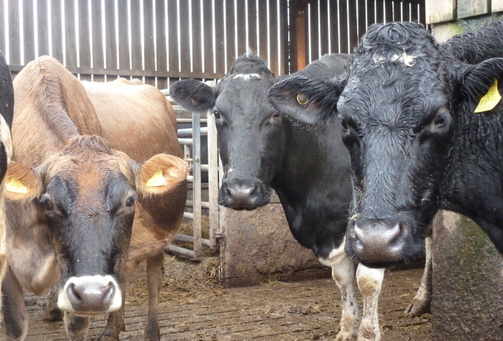Cattle
Mobility Scoring Here at RALS Ltd we offer a Mobility Scoring service to complement our foot trimming. Our aim is to offer you a complete cattle hoof care package. The age old adage "prevention is better than cure" has never been more true. Lameness problems reduce herd profitabilty both directly through milk losses, and indirectly through reduced fertility and increased culling. The first step in decreasing lameness is determining incidence level and severity. Mobility scoring identifies all levels of lameness in a herd, especially those cases which may not be identified by casual observation. At RALS Ltd we use the DairyCo Mobility Scoring system, which was developed with the University of Bristol in conjunction with farmers, veterinary surgeons and other animal health and welfare organisations. It simply assesses the cow's ability to move easily, without attempting to account for factors influenced by an animal's breeding or conformation. See www.dairyco.org.uk for more information. It is a 4 point scoring system from 0-3 and is a relatively quick and simple qualitative assessment of the ability of cows to walk normally. The benefits of the Mobility Scoring system include:
Rather than having to deal with long standing lameness issues, we would like to examine the feet of all cattle that we deem to have a mobility score of 2 and 3. This way we can detect problems far earlier, resulting in quicker treatment for the animal which in turn will equate to fewer losses for you. It is much quicker for us to examine cattle at this early stage rather than having to carry out lengthier treatment which may include the applying of blocks and bandages. For example, we aim to detect and treat hoof problems where bruising is present rather than where sole ulcers have developed. Early intervention will prevent more severe lameness problems from developing. We are happy to talk through the best options for you and your herd. We can discuss your current herd hoof status, housing and turnout, mobility scoring and treatment options which may include cubicle adaptation, changes in herd care and management and foot trimming. Working together throughout the year and implementing our hoof care regime we are confident that you will quickly see the benefits of having a healthier and happier herd. We will liaise with you to ensure that high levels of cattle lameness, time and financial losses become a thing of the past. Can you really afford not to Mobility Score your herd? We look forward to stepping forward with you. Faecal Egg Counts (FEC) RALS is also very excited to announce that we are now able to carry out all your herd Faecal Egg Counts (FEC) for you using the FECPAK system (See also Our Services - Cattle page). The FECPAK system was developed in New Zealand and is only available in the UK through Innovis. Here at RALS we are now able to offer you the benefits of this system. Faecal Egg Counting (FEC) is a simple diagnostic technique which calculates the number of internal parasite eggs per gram (EPG) of faeces. The FECPAK system for cattle has been developed to achieve a higher level of test sensitivity (10 epg). Poor sensitivity of some traditional systems will lead to increased variability and poor results. The FECPAK system allows us to undertake "on the spot" parasite assessment if necessary or we will collect samples from you which we will analyse and then we will discuss your herd FEC count with you and advise you on your drenching options. We are able therefore to provide you with the ability to monitor worm burdens on a number of mobs quickly, easily and cost effectively, allowing you to make more accurate and timely drench decisions. There is a common misconception that FEC can only be used to decide whether or not to drench. The biggest advantage is in building up a picture of the unique roundworm status of your farm, (which is affected by many factors including climatic conditions, stocking rate, sheep:cattle ratio, age of stock and management practices), and using that information in conjunction with a good understanding of the parasite's lifecycle to devise strategies to limit the production losses due to worms on your property. These strategies may involve altering how often you drench, a change in your stock classes, crops and grazing management. The important issue is that you cannot make a good decision without good information, so, let us monitor it, so you can manage it. It is advised that in order to provide management information FEC must be carried out regularly at certain times of year. Between 30 - 90 composite tests per season would be fairly standard. CAUTION! It is important to note that we are NOT able to detect or monitor Lungworm or Fluke when using FECPAK. Financial Benefit (information provided by Innovis) Save on Drench:
Save on boluses:
If you are an organic farmer then you will need to take a holistic approach to parasite management. Contamination mapping and fine tuning your grazing management. To summarise, regular FEC monitoring will allow you to develop unique management strategies and enable you to spend less time and money on worm control without compromising on production. Let us eliminate the guesswork for you.
|


